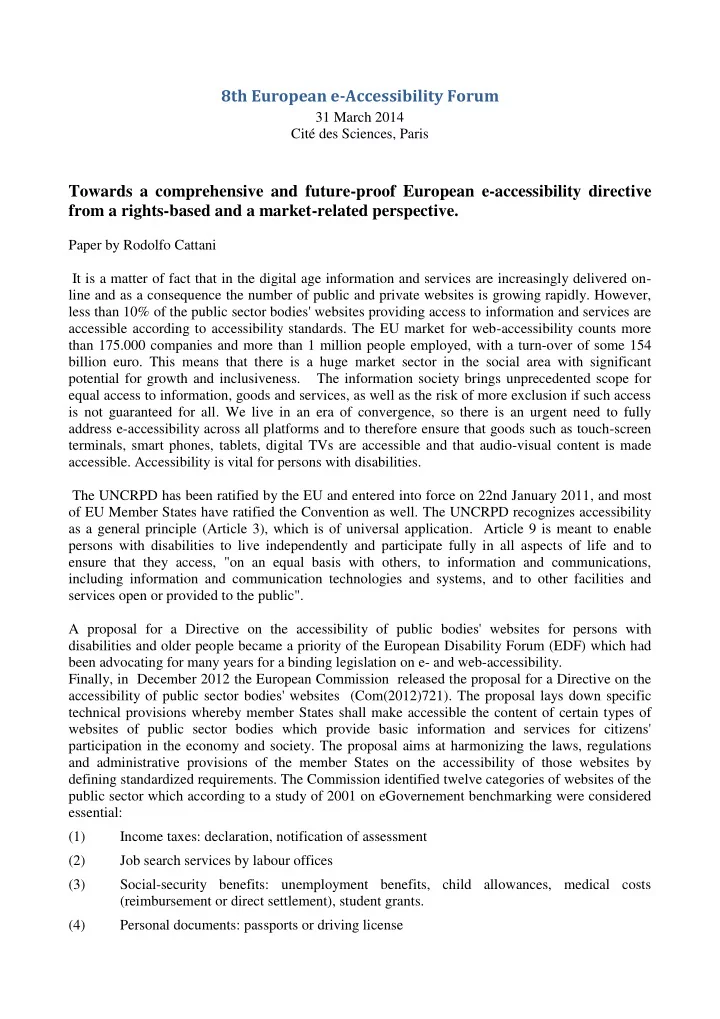

8th European e-Accessibility Forum 31 March 2014 Cité des Sciences, Paris Towards a comprehensive and future-proof European e-accessibility directive from a rights-based and a market-related perspective. Paper by Rodolfo Cattani It is a matter of fact that in the digital age information and services are increasingly delivered on- line and as a consequence the number of public and private websites is growing rapidly. However, less than 10% of the public sector bodies' websites providing access to information and services are accessible according to accessibility standards. The EU market for web-accessibility counts more than 175.000 companies and more than 1 million people employed, with a turn-over of some 154 billion euro. This means that there is a huge market sector in the social area with significant potential for growth and inclusiveness. The information society brings unprecedented scope for equal access to information, goods and services, as well as the risk of more exclusion if such access is not guaranteed for all. We live in an era of convergence, so there is an urgent need to fully address e-accessibility across all platforms and to therefore ensure that goods such as touch-screen terminals, smart phones, tablets, digital TVs are accessible and that audio-visual content is made accessible. Accessibility is vital for persons with disabilities. The UNCRPD has been ratified by the EU and entered into force on 22nd January 2011, and most of EU Member States have ratified the Convention as well. The UNCRPD recognizes accessibility as a general principle (Article 3), which is of universal application. Article 9 is meant to enable persons with disabilities to live independently and participate fully in all aspects of life and to ensure that they access, "on an equal basis with others, to information and communications, including information and communication technologies and systems, and to other facilities and services open or provided to the public". A proposal for a Directive on the accessibility of public bodies' websites for persons with disabilities and older people became a priority of the European Disability Forum (EDF) which had been advocating for many years for a binding legislation on e- and web-accessibility. Finally, in December 2012 the European Commission released the proposal for a Directive on the accessibility of public sector bodies' websites (Com(2012)721). The proposal lays down specific technical provisions whereby member States shall make accessible the content of certain types of websites of public sector bodies which provide basic information and services for citizens' participation in the economy and society. The proposal aims at harmonizing the laws, regulations and administrative provisions of the member States on the accessibility of those websites by defining standardized requirements. The Commission identified twelve categories of websites of the public sector which according to a study of 2001 on eGovernement benchmarking were considered essential: (1) Income taxes: declaration, notification of assessment (2) Job search services by labour offices (3) Social-security benefits: unemployment benefits, child allowances, medical costs (reimbursement or direct settlement), student grants. (4) Personal documents: passports or driving license
(5) Car registration (6) Application for building permission (7) Declaration to police, e.g. in case of theft (8) Public libraries, e.g. catalogues and search tools (9) Request and delivery of birth or marriage certificates (10) Enrolment in higher education or university (11) Notification of change of residence (12) Health-related services: interactive advice on the availability of services, online services for patients, appointments. However, this first timid step in the right direction did not meet the expectations of the disability movement as it was deemed to be too late, too little. In particular, the scope of the directive appeared too narrow, since the proposed categories don ’ t cover the majority of the basic services to the public, such as Child care, Primary education, Secondary education, General and local elections, Public transport, Cultural activities. Furthermore no satisfactory enforcement and monitoring mechanisms were foreseen. Moreover, the proposal uses a merely Internal Market legal basis (TFEU article 114). This approach was chosen because the diverging legal obligations and policies put in place by the EU Member States fragment the internal market of web-accessibility. This implies additional costs for market players and consumers and impedes the free movement of goods and services. This approach is unsatisfactory because Article 3 of the Treaty on European Union (TEU) states that the role of the market is, among others, social inclusion, equality, non-discrimination and social justice. In addition to that, no explicit reference to accessibility as a right was made in the proposal. As a consequence EDF decided to continue its campaign and started a fruitful collaboration with the European Parliament, which on the 26 of February at its penultimate plenary session of this mandate approved a far more ambitious "Proposal For A Directive Of The European Parliament And of The Council on the accessibility of public sector bodies' websites and websites operated by entities performing public tasks". Thanks to the commitment of the rapporteur and the positive work of the members of the Internal Market and Consumer Protection Committee, who expressed the view that the measures proposed by the Commission were neither sufficient nor far-reaching enough, the text has been substantially improved as extremely valuable changes have been introduced to the Commission proposal. First of all the Parliament has extended the scope of the directive which now includes all public websites and also those websites belonging to private entities that are providing basic services to the public. In annex A the following website's categories are listed: (1) Network services: gas, heat, electricity and water services; postal services; electronic communication network and services; (2) Transport-related services; (3) Basic banking and insurance services (including at least the following: basic payment account, home contents and building insurance, life insurance and medical insurance); (4) Primary, secondary, higher and adult education; (5) Statutory and complementary social security schemes covering the main risks of life (including at least those linked to health, ageing, occupational accidents, unemployment, retirement and disability);
Recommend
More recommend